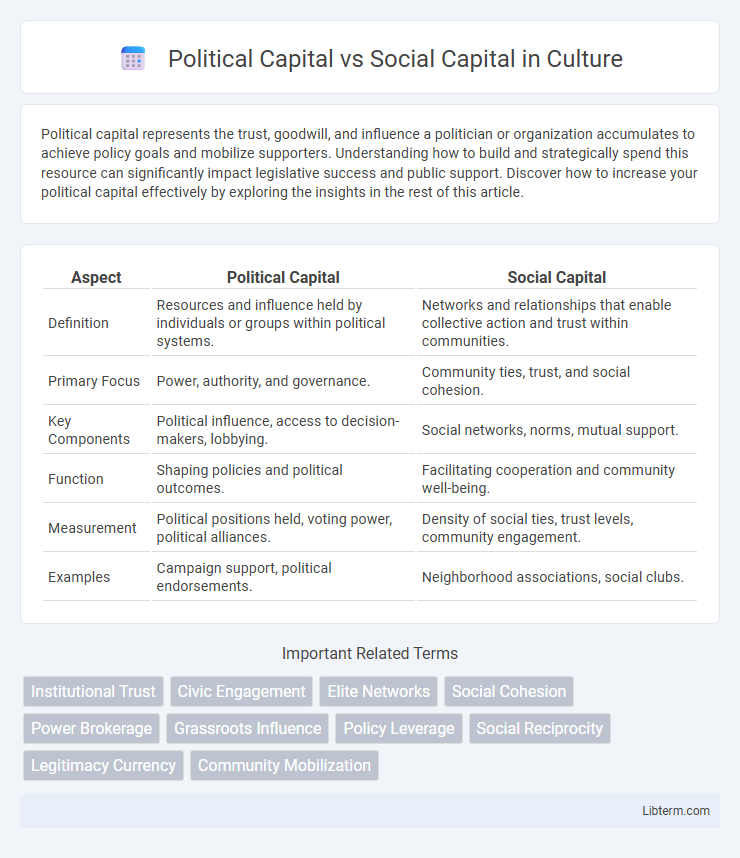Political capital represents the trust, goodwill, and influence a politician or organization accumulates to achieve policy goals and mobilize supporters. Understanding how to build and strategically spend this resource can significantly impact legislative success and public support. Discover how to increase your political capital effectively by exploring the insights in the rest of this article.
Table of Comparison
| Aspect | Political Capital | Social Capital |
|---|---|---|
| Definition | Resources and influence held by individuals or groups within political systems. | Networks and relationships that enable collective action and trust within communities. |
| Primary Focus | Power, authority, and governance. | Community ties, trust, and social cohesion. |
| Key Components | Political influence, access to decision-makers, lobbying. | Social networks, norms, mutual support. |
| Function | Shaping policies and political outcomes. | Facilitating cooperation and community well-being. |
| Measurement | Political positions held, voting power, political alliances. | Density of social ties, trust levels, community engagement. |
| Examples | Campaign support, political endorsements. | Neighborhood associations, social clubs. |
Understanding Political Capital
Political capital refers to the trust, goodwill, and influence a politician or political entity accumulates to achieve policy goals and negotiate power. It involves the ability to mobilize support among stakeholders, leverage relationships within government institutions, and effectively use reputation to advance legislative agendas. Understanding political capital requires analyzing factors such as public approval, party alignment, and strategic alliances that shape decision-making processes in governance.
Defining Social Capital
Social capital refers to the networks, norms, and trust that enable individuals and groups to collaborate effectively and achieve mutual benefits within a community or society. It encompasses relationships, shared values, and social cohesion that facilitate cooperation and collective action. Unlike political capital, which is rooted in power and influence within governance structures, social capital emphasizes social connections and communal support systems.
Key Differences Between Political and Social Capital
Political capital refers to the influence and power accumulated by individuals or groups within political systems, enabling them to shape policies and decision-making processes. In contrast, social capital encompasses the networks, relationships, and trust among individuals or communities that facilitate cooperation and mutual benefit. Key differences lie in their functions: political capital operates through formal institutions and authority, while social capital thrives in informal social interactions and collective norms.
The Role of Trust in Social Capital
Trust is a fundamental component of social capital, facilitating cooperation and strengthening interpersonal relationships within communities. Unlike political capital, which derives from authority and influence over political structures, social capital emerges from networks of trust and shared norms that enable collective action. High levels of trust reduce transaction costs and promote social cohesion, essential for effective governance and community resilience.
How Political Capital Influences Decision-Making
Political capital, built through trust, influence, and networks within political institutions, significantly shapes decision-making by enabling leaders to negotiate, mobilize support, and implement policies effectively. It determines the extent to which policymakers can leverage power and alliances to achieve strategic objectives, often prioritizing political agendas over purely social interests. The accumulation and deployment of political capital directly impact legislative outcomes, governance stability, and resource allocation in complex political environments.
Building and Sustaining Social Capital
Building and sustaining social capital relies on fostering trust, reciprocity, and strong networks within communities, which enhances collective action and social cohesion. Unlike political capital, which depends on influence and power within formal institutions, social capital is cultivated through repeated interactions, shared norms, and mutual support among individuals and groups. Effective social capital strengthens community resilience and facilitates cooperation, playing a critical role in social development and governance.
Measuring the Impact of Political Capital
Political capital is measured by assessing the influence and resources politicians have to achieve policy goals, including network strength, access to decision-makers, and legislative success rates. Quantitative indicators such as the number of bills sponsored, voting alignment with party leadership, and fundraising capacity reflect the tangible impact of political capital. Analyzing shifts in public support, coalition-building effectiveness, and media presence further illustrates the broader influence political capital exerts on governance outcomes.
Interplay Between Political and Social Capital
The interplay between political capital and social capital shapes governance and community dynamics by combining institutional influence with trust-based networks. Political capital leverages authority and policy-making power, while social capital builds cooperation through relationships and shared norms, enhancing collective action. This synergy enables effective mobilization of resources, fostering social cohesion and strengthening democratic processes.
The Importance of Capital in Civic Engagement
Political capital enhances the ability to influence government decisions through networks, trust, and access to power, making it vital for effective civic participation. Social capital, rooted in social networks and community trust, fosters collective action and cooperation in addressing local issues. Both forms of capital are essential as they build the foundation for sustained civic engagement and empower individuals and groups to drive social change.
Strengthening Communities Through Political and Social Capital
Political capital empowers communities by enabling access to decision-making processes, policy influence, and resource allocation, fostering effective governance. Social capital builds trust, networks, and cooperation among community members, enhancing collective action and social cohesion. Strengthening both forms of capital creates resilient communities capable of addressing local challenges and achieving sustainable development.
Political Capital Infographic

 libterm.com
libterm.com